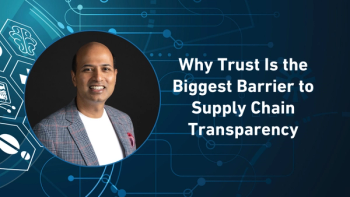
LogiPharma USA 2024: How Pharma Can Reach Its Sustainability Goals
A panel offers insight surrounding the industry’s carbon footprint, including ways to begin initiating positive change.
One topic of major focus at this year’s LogiPharma USA is sustainability. Of course, some could make the argument that it has been a buzzword for quite some time now, as noted by various stakeholders’ pledges to achieve net zero emissions over the next couple of decades. However, what is just as important as one stating his or her intent to solve a problem is one’s effort in determining how to solve it.
A panel discussion regarding "How Pharma Can Better Understand Its Carbon Footprint and Reach Sustainability Goals" convened yesterday, and was moderated by Joe Van Der Bosch, president of DeSpir Logistics. He was joined by Alaina Passavant, account manager, CDP Supply Chain; Kaushik Datta, a pharma supply chain expert, Chandan Trehan, digital supply chain & sustainability Lead with Bosch; Jeff Tucker, CEO, Tucker Company Worldwide, and Joe McCannon, director for sustainability at the Office of the Federal Chief Sustainability Officer, Council on Environmental Quality (CEG).
The presentation was powered by multiple objectives, including:
- Becoming aware of various the types of data and data sharing that is happening across the ecosystem.
- Defining carbon offsetting and how it can be of value to reach sustainability goals.
- Demonstrating the results and benefits of sustainability efforts
Challenges in getting good data
From Passavant’s point of view, there is certainly plenty to be done in this regard, and with these efforts comes complexity.
“From my seat and who I work with, there are companies who want this environmental data, whether it be emissions, energy use, or water and commodity tracking from their suppliers. They're trying to understand what their supply chain is doing,” she explained. “They come to CDP, because we have a questionnaire that tracks this and asks suppliers and companies about this. They're finding that the most basic thing is that they don't know who to contact at their suppliers. They don't know who's responsible. They don't know if their supplier has a sustainability team or is aware of what even emissions are.
“ … I think one of the big opportunities that we're having, though, is that there is a significant growth in expectations of improving on all topics, whether that be sustainability for planet or sustainability for cost reductions, profit margins, etc., but just having that growth and the opportunity to come together as customers in a similar level of your supply chain to then ask your suppliers to do XYZ or to report on things [is valuable].”
In that manner, supply chain stakeholders can come together to agree upon common KPIs, which can drive action and improvement forward. After all, it’s impossible to improve something that immeasurable.
Utilizing technology for results
When it comes to how tech can help support industry’s efforts in achieving change, Trehan pointed out that it ought to stem from the use of both artificial intelligence and internet of things, as these can be beneficial toward the environment.
“When you use technologies like these, you are not just improving efficiency, but you are also reducing wastages in your supply chain, which have a direct impact on the sustainability aspect,” he explained. “When you bring in a technology like blockchain, you're creating a more democratized balance of information data sharing between your supply chain partners, which essentially brings down the resistance to a little bit to some extent when it comes information sharing; we know we work in a very regulated environment, and any information or any data which is not necessarily required for any regulatory filing is often received with a lot of resistance. People ask, why do you need this data?
“… One thing that I'll definitely say is when we embark on a journey of making investments in the supply chain, especially around technology, we have to approach it with a little bit of guarded optimism. There's no one technology that can solve the problem in its entirety. It's a team game, and everybody either wins or loses together. So that kind of guarded optimism is absolutely necessary.”
Government insight
Van Der Bosch posed the question to McCannon, is what's being described as how industry is responding to this challenge any different when you look inside the government, and how do you think the government can help support the industry in these initiatives?
Being that he works for the federal government, McCannon noted that industry’s take on the situation is not that dissimilar from government’s perspective. However, being that the government functions as one massive organization, the challenge lies in orchestrating it to be more effective, more sustainable, and more resilient. As the largest purchaser of goods and services in the world, a lot of the day to day involves trying to navigate this complexity of orchestration and understanding how the CEQ can work with all of the agencies in the executive branch.
“I would say that the way we've approached, the way we've started is by trying to set very clear, expectations for what we hope to accomplish, and also to set an example for other governments and other organizations,” he said. “That started with something called Executive Order 14057, which came out in December of 2021, and this executive order said, in pursuit of a net zero emissions economy by 2050, the federal government is going to make some really serious commitments to decarbonizing its own operations.”
He also revealed breaking news regarding a program that will be released in the coming weeks.
“ … I think this is the first time that's being shared that we are launching in the middle of October, something called the Supplier Accelerator, which will be a web-based program, starting with webinars, where we'll basically be walking through the really vast federal resources that are available to help organizations—and certainly including pharmaceutical organizations, which are some of our biggest suppliers—to take advantage of the resources that were introduced by several Biden-Harris administration programs, including the Inflation Reduction Act. And this has billions of dollars in it in the form of incentives, tax credits, grants, which can be used for onsite microgrids, building efficiency projects, electrification of fleets, and introduction of vehicle charging infrastructure.”
Reference
VDB J, Passavant A, Datta K, Trehan C, McCannon J. How Pharma Can Better Understand Its Carbon Footprint and Reach Sustainability Goals. September 24, 2024. LogiPharma USA 2024. Boston.
Newsletter
Stay ahead in the life sciences industry with Pharmaceutical Commerce, the latest news, trends, and strategies in drug distribution, commercialization, and market access.




